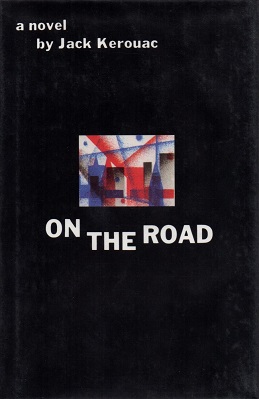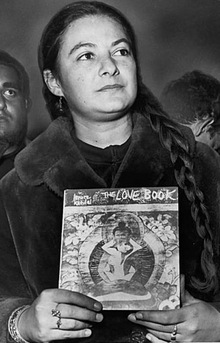
Jean-Louis Lebris de Kérouac, known as Jack Kerouac, was an American novelist and poet who, alongside William S. Burroughs and Allen Ginsberg, was a pioneer of the Beat Generation.

Beatniks were members of a social movement in the 1950s and early 1960s who subscribed to an anti-materialistic lifestyle. They rejected the conformity and consumerism of mainstream American culture and expressed themselves through various forms of art, such as literature, poetry, music, and painting. They also experimented with spirituality, drugs, sexuality, and travel. The term “beatnik” was coined by San Francisco Chronicle columnist Herb Caen in 1958, as a derogatory label for the followers of the Beat Generation, a group of influential writers and artists who emerged in the late 1940s and early 1950s. The name was inspired by the Russian suffix “-nik”, which was used to denote members of various political or social groups. The term “beat” originally was used by Jack Kerouac in 1948 to describe his social circle of friends and fellow writers, such as Allen Ginsberg, William S. Burroughs, and Neal Cassady. Kerouac said that “beat” had multiple meanings, such as “beaten down”, “beatific”, “beat up”, and “beat out”. He also associated it with the musical term “beat”, which referred to the rhythmic patterns of jazz, a genre that influenced many beatniks.

The Beat Generation was a literary subculture movement started by a group of authors whose work explored and influenced American culture and politics in the post-World War II era. The bulk of their work was published and popularized by Silent Generationers in the 1950s, better known as Beatniks. The central elements of Beat culture are the rejection of standard narrative values, making a spiritual quest, the exploration of American and Eastern religions, the rejection of economic materialism, explicit portrayals of the human condition, experimentation with psychedelic drugs, and sexual liberation and exploration.

On the Road is a 1957 novel by American writer Jack Kerouac, based on the travels of Kerouac and his friends across the United States. It is considered a defining work of the postwar Beat and Counterculture generations, with its protagonists living life against a backdrop of jazz, poetry, and drug use. The novel is a roman à clef, with many key figures of the Beat movement, such as William S. Burroughs, Allen Ginsberg, and Neal Cassady represented by characters in the book, including Kerouac, himself, as the narrator, Sal Paradise.

Lenore Kandel was an American poet, affiliated with the Beat Generation and Hippie counterculture.

Janet Michelle "Jan" Kerouac was an American writer and the only child of beat generation author Jack Kerouac and Joan Haverty Kerouac.

Joyce Johnson is an American author of fiction and nonfiction. She was born Joyce Glassman in 1935 to a Jewish family in New York City and raised in the Morningside Heights neighborhood of Manhattan, a few blocks from the apartment of Joan Vollmer Adams where William Burroughs, Allen Ginsberg and Jack Kerouac lived from 1944 to 1946. She was a child actress and appeared in the Broadway production of I Remember Mama, which she writes about in her 2004 memoir Missing Men.

Desolation Angels is a semi-autobiographical novel written by Beat Generation author Jack Kerouac, which makes up part of his Duluoz Legend. It was published in 1965, but was written years earlier, around the time On the Road was in the process of publication. The events described in the novel take place from 1956-1957. Much of the psychological struggle which the novel's protagonist, Jack Duluoz, undergoes in the novel reflects Kerouac's own increasing disenchantment with the Buddhist philosophy. Throughout the novel, Kerouac discusses his disenchantment with fame, and complicated feelings towards the Beat Generation. He also discusses his relationship with his mother and his friends such as Allen Ginsberg, Neal Cassady, Lucienn Carr and William S. Burroughs. The novel is also notable for being a relatively positive portrayal of homosexuality and homosexual characters, despite its use of words that were at the time considered homophobic slurs.

And the Hippos Were Boiled in Their Tanks is a novel by Jack Kerouac and William S. Burroughs. It was written in 1945, a full decade before the two authors became famous as leading figures of the Beat Generation, and remained unpublished in complete form until 2008.
Carolyn Elizabeth Robinson Cassady was an American writer and associated with the Beat Generation through her marriage to Neal Cassady and her friendships with Jack Kerouac, Allen Ginsberg, and other prominent Beat figures. She became a frequent character in the works of Jack Kerouac.

Elise Nada Cowen was an American poet. She was part of the Beat generation, and was close to Allen Ginsberg, one of the movement's leading figures.
Ann Charters is Professor Emerita of American Literature at the University of Connecticut at Storrs. She is a Jack Kerouac and Beat Generation scholar.
Lucia Brown Berlin was an American short story writer. She had a small, devoted following, but did not reach a mass audience during her lifetime. She rose to sudden literary fame in 2015, eleven years after her death, with the publication of a volume of her selected stories, A Manual for Cleaning Women. It hit The New York Times bestseller list in its second week, and within a few weeks had outsold all her previous books combined.
Bobbie Louise Hawkins was a short story writer, monologist, and poet.
Joan Huber is an American sociologist and professor emeritus of sociology at Ohio State University. Huber served as the 79th president of the American Sociological Association in 1989. Huber taught at the University of Notre Dame from 1967 to 1971, eventually moving to Illinois, where she taught at the University of Illinois at Urbana/Champaign. While instructing numerous sociology courses at the University of Illinois at Urbana/Champaign, Huber served as the director of Women's Studies Program for two years (1978–1980), and then became the head of the Department of Sociology in 1979 until 1983. In 1984, Huber left Illinois for an opportunity at the Ohio State University, where she became the dean of the College of Social and Behavioral Sciences, coordinating dean of the Colleges of the Arts and Sciences, and senior vice president for academic affairs and university provost. During her time, Huber was president of Sociologists for Women in Society from 1972–1974, the Midwest Sociological Society from 1979–1980, and the American Sociological Association from 1988–1989. Being highly recognized for her excellence, in 1985 Huber was given the Jessie Bernard Award by the American Sociological Association. Not only was Huber an instructor of sociology at multiple institutions or president of different organization, she also served different editorial review boards, research committees, and counseled and directed many institutions on their sociology departments.
Ronna C. Johnson is a Professor of English at Tufts University in Medford, Massachusetts. Johnson is an established authority on the Beat Generation. She has worked as a fiction editor for ASPECT magazine, Zephyr Press, and Dark Horse magazine. She is also the co-editor of the Journal of Beat Studies published by Pace University Press, a founding board member of the Beat Studies Association, and the co-editor of the Beat Studies book series published by Clemson University Press/Liverpool University Press.
Joan Haverty Kerouac, born Joan Virginia Haverty, was the second wife of writer Jack Kerouac and the author of an autobiography, Nobody's Wife: The Smart Aleck and the King of the Beats. Joan Kerouac's autobiography, which existed only in manuscript form when she died, appeared in book form in 2000 after the Kerouacs' only child, Jan Kerouac, her half-brother, David, and David's brother-in-law John Bowers helped prepare it for publication.
ruth weiss, born Ruth Elisabeth Weisz, was a poet, performer, playwright and artist. Born in Germany, but of Austrian citizenship, weiss made her home and career in the United States. She was considered to be a member of the Beat Generation, a label she, in later years, embraced.
Franco American literature is a body of work, in English and French, by French-Canadian American authors "who were born in New England...born in Canada, [and] spent most of their lives in New England...[, or] those who only traveled through New England and wrote of their experiences." "Franco-American literature" however, as a term, has also been characterized by novels written by the Great Lakes Region diaspora as well. In a broader sense the term is also used as a handle for those writers of Cajun or French descent, outside of the Quebec émigré literary tradition.
Bonnie Bremser, born Brenda Frazer, is a Beat writer and protofeminist figure known for her epistolary memoir Troia: Mexican Memoirs, also published in the U.K. as For Love of Ray.









